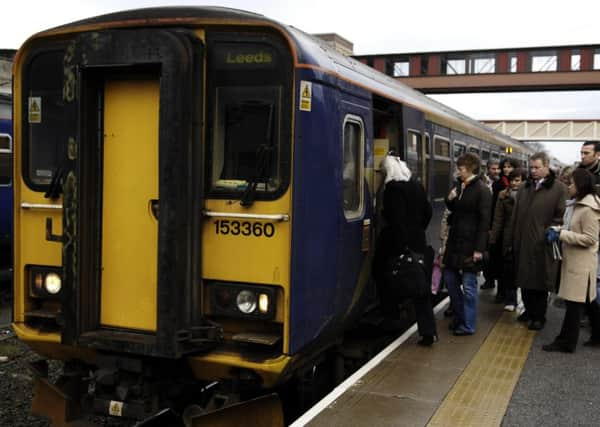Value for money backlash to rail fare hike


Next year’s rise may be the smallest annual increase since 2010 but campaign groups said passengers remain deeply disillusioned by the value they are getting for their money, with overcrowding on decades-old carriages still a major complaint.
The new fares will take effect on January 2, rail industry body the Rail Delivery Group (RDG) announced.
Advertisement
Hide AdAdvertisement
Hide AdThe average rise for regulated fares - which is about half of the total and includes season tickets - is limited to no more than one per cent as it is linked to July’s rate of Retail Price Index inflation.
But unregulated fares, such as off-peak leisure tickets, go up by whatever amount the train companies decide.
Chris Hyomes, vice-chairman of lobby group Railfuture Yorkshire, derided the situation as he believes Yorkshire continues to get a bad deal when it comes to investment levied from fare rises.
“It just feels like we are seeing passengers here in the North paying for all the investment in the South,” he said, pointing to the billions spent on London’s Crossrail scheme.
Advertisement
Hide AdAdvertisement
Hide Ad“In the lifetime of the Northern franchise, awarded in November 2004, we’ve seen a 50 per cent rise in passenger numbers compared to around a five per cent rise in additional rolling stock.”
Martin Abrams, of the Campaign for Better Transport, said fares in Britain have now increased by over 25 per cent in the past five years and called for better ticketing policies.
“To avoid pricing people off the railways, the train operating companies and the Government need to work closely together to provide fairer, simpler and cheaper fares through flexible ticketing and making sure people are always sold the cheapest ticket available,” he said.
David Sidebottom, passenger director at independent watchdog Transport Focus, said it was critical the industry delivers a more reliable day-to-day railway and starts to offer more flexible ticketing products.
Advertisement
Hide AdAdvertisement
Hide AdShadow transport secretary Lilian Greenwood added: “Commuters were always told that higher fares would fund investment, but vital projects have been delayed for years and passengers are paying ever more to travel on increasingly overcrowded and unreliable trains.”
The new fare hike is “another kick in the teeth for the British passenger who is already paying some of the highest fares in Europe”, said Mick Cash, general secretary of the Rail, Maritime and Transport union.
Paul Plummer, chief executive of the RDG which represents train operators and Network Rail, said: “We know that nobody likes to pay more to travel by train, especially to get to work, and at 1.1 per cent this is the smallest average increase in fares for six years. On average 97p in every pound from fares is spent on trains, staff and other running costs.”
LONG TERM SEASON TICKET SAVINGS
Following the announcement of another rail fare hike, the Government’s Rail Minister Claire Perry claimed the Conservative Party was “helping hard-working people with the cost of transport”.
Advertisement
Hide AdAdvertisement
Hide AdDespite the criticisms of passenger campaign groups, the MP for Devizes, Wiltshire, claimed that the decision to link regulated fare increases to no more than Retail Price Index inflation will save the average season ticket holder a total of £425 by 2020.
She added: “Our plan for passengers is improving journeys for everyone.
“It’s transforming the tickets people buy, how much they pay for them, the trains they sit on, how quickly they arrive and the stations they arrive in.”